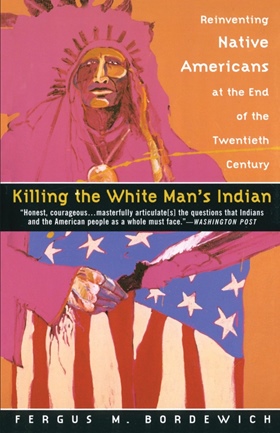Description
In the face of a new lightly romanticized view of Native Americans, Killing the White Man's Indian bravely confronts the current myths and often contradictory realities of tribal life today. Following two centuries of broken treaties and virtual government extermination of the "savage redmen," Americans today have recast Native Americans into another, equally stereotyped role, that of eternal victims, politically powerless and weakened by poverty and alcoholism, yet whose spiritual ties with the natural world form our last, best hope of salvaging our natural environment and ennobling our souls.
The truth, however, is neither as grim , nor as blindly idealistic, as many would expect. The fact is that a virtual revolution is underway in Indian Country, an upheaval of epic proportions. For the first time in generations, Indians are shaping their own destinies, largely beyond the control of whites, reinventing Indian education and justice, exploiting the principle of tribal sovereignty in ways that empower tribal governments far beyond most American's imaginations. While new found power has enriched tribal life and prospects, and has made Native Americans fuller participants in the American dream, it has brought tribal governments into direct conflict with local economics and the federal government.
Based on three years of research on the Native American reservations, and written without a hidden conservative bias or politically correct agenda, Killing the White Man's Indian takes on Native American politics and policies today in all their contradictory--and controversial-guises."
About the Author
FERGUS M. BORDEWICH is the author of eight non-fiction books: "Congress at War: How Republican Reformers Fought the Civil War, Defied Lincoln, Ended Slavery, and Remade America"; "The First Congress: How James Madison, George Washington, and a Group of Extraordinary Men Invented the Government" (awarded the Hardeman Prize in American History, in 2019); "America's Great Debate: Henry Clay, Stephen A. Douglas and the Compromise that Preserved the Union" (winner of the Los Angeles Times award for best history book, in 2013); "Washington: The Making of the American Capital" (named by the Washington Post as one f the best books of 2008); "Bound for Canaan: The Underground Railroad and the War for the Soul of America (named by the American Booksellers' Association as one of the ten best books of 2005)"; "My Mother’s Ghost," a memoir; "Killing the White Man’s Indian: Reinventing Native Americans at the End of the Twentieth Century"; and "Cathay: A Journey in Search of Old China." He has also published an illustrated children’s book, "Peach Blossom Spring" and has written the script for a PBS documentary about Thomas Jefferson, "Mr. Jefferson’s University." He also edited an photo-illustrated book of eyewitness accounts of the 1989 Tiananmen Massacre, "Children of the Dragon." He regularly reviews books for the Wall Street Journal. His articles and essays have appeared in The New York Times, TIME Magazine, American Heritage, Smithsonian Magazine, the Civil War Monitor, and many other publications. He lives in San Francisco with his wife, Jean Parvin Bordewich.BORDEWICH WAS BORN in New York City in 1947, and grew up in Yonkers, New York. While growing up, he often traveled to Indian reservations around the United States with his mother, LaVerne Madigan Bordewich, the executive director of the Association on American Indian Affairs, then the only independent advocacy organization for Native Americans. This early experience helped to shape his lifelong preoccupation with American history, the settlement of the continent, and issues of race, poverty, and political power. He holds degrees from the City College of New York and Columbia University. In the late 1960s, he did voter registration for the NAACP in the still-segregated South; he also worked as a roustabout in Alaska’s Arctic oil fields, a taxi driver in New York City, and a deckhand on a Norwegian freighter.He has been an independent writer and historian since the early 1970s. As a journalist, he traveled extensively in Asia, the Middle East, Europe, and Africa, writing on politics, economic issues, culture, and history, on subjects including Islamic fundamentalism, the plight of the Kurds in northern Iraq, civil war in Burma, religious repression in China, Kenya’s population crisis, German Reunification, the peace settlement in Ireland, and other issues. He also served for brief periods as an editor and writer for the Tehran Journal in Iran, in 1972-1973, a press officer for the United Nations, and an advisor to the New China News Agency in Beijing, in 1982-1983, when that agency was embarking on its effort to move from a propaganda model toward a western-style journalistic one.
